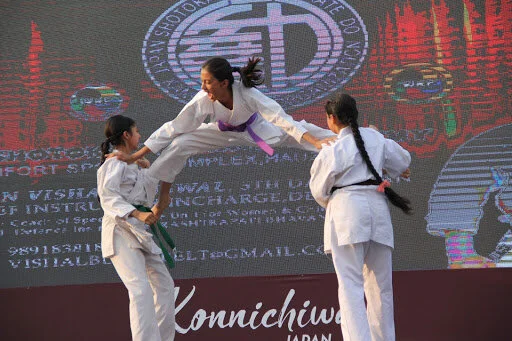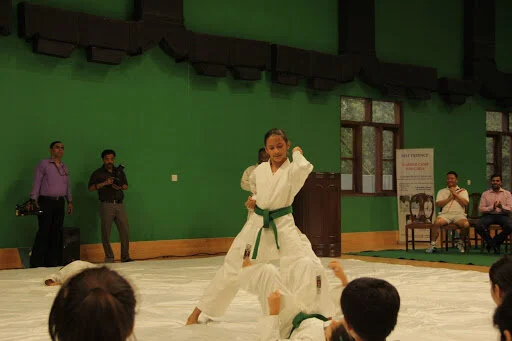Gulabi Gang: India’s Vigilante Warriors
By Raiaa Bhalla
Raiaa is a 14 year old high school student from India. She enjoys reading, art, theatre, debate and is a passionate student of karate. She loves researching and discussing current events and world issues. She is passionate about gender equality and hopes to create a more equal world.
Deep within the forests of India, in their unofficial headquarters in the Banda district of Uttar Pradesh, you may chance upon a congression of village women planning their next rescue mission. Clad in bright pink saris with bamboo sticks in hand, these women form a self described ‘Gang of Justice’ and have made it their responsibility to combat domestic abuse-A type of violence faced by 2 out of 3 married women in India. Their leader, Sampat Pal Devi was a child bride herself and her struggles inspired her to combat the deeply patriarchal culture, rigid caste divisions, domestic violence, female illiteracy, child marriage and dowry demands that are so prevalent in village India.
Before starting her campaign for justice, Devi lived the life of an ordinary village wife in the impoverished region of Banda: she was married off at the age of 12 to a much older man, and gave birth to 5 children by the age of 20. She received little or no formal education and worked as a government health employee, earning a meagre income to support her family.
However, one day, she witnessed a man abusing his wife mercilessly. When Devi begged him to stop, he began to hurt her as well. This incident served as a wake up call for Devi, who began to realize the urgency for change in the status of women in Banda.
The next day Devi returned to the man’s house with a bamboo stick and 5 of her friends to ensure that he would not harm another woman again.
News of this incident spread rapidly and soon many women in similar situations came to Devi requesting her intervention in their affairs. Devi realized that she alone would not be able to single handedly influence change on such a large scale, hence she began to induct and recruit others to her cause. One pink sari and bamboo stick later, many of the women who had come to Devi for help became members of the gang in the hopes of spreading the assistance that they had received.
‘I have learnt that our greatest strength is when we are united’, says Devi. ‘United we are unbeatable’. Her group has now expanded to over 400,000 members and they meet with the young women seeking their assistance on a daily basis. They continue to moderate, persuade and occasionally employ violence to combat the rampant inequality faced by women. The group only employs violence as a last resort, and as Devi put it: ’The stick is self-defense’.
Their mission is to support women, educate them, and help them become financially secure through sustainable livelihood options. They aim to protect the powerless from abuse and fight injustice and corruption. They have helped countless women and families seek justice and have established themselves as a powerful force in Uttar Pradesh. In fact, their influence is so great that they are feared even by government officials.
In 2008, the gang received information that officials in a nearby electricity office had cut the power, returning it only in exchange for bribes. As soon as the bright pink fabric was spotted by these government workers, the power was returned immediately, and electricity was restored in the region.
Despite their effect, Gulabi gang’s forceful methods have often been criticised, and they have been told to stick to legal procedures, instead of taking matters into their own hands.
They nevertheless continue with their practises, believing that the legal system does not provide fair punishments as those who are from a lower class and without wealth and influence are often denied justice.
The Gulabi Gang is revolutionizing the idea of an empowered woman in India, and even if some disagree on the methods being implemented, the impact these ladies have left is undeniable.
References:
https://core.ac.uk/download/pdf/148360741.pdf
https://www.theguardian.com/world/2011/mar/08/sampat-pal-devi-100-women
https://www.aljazeera.com/features/2014/3/4/gulabi-gang-indias-women-warriors
















